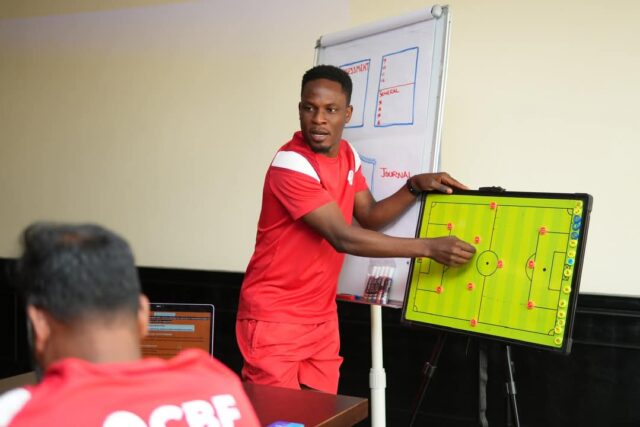Coach Ayere Sylvester, a UEFA B licensed coach with experience both in Nigeria and abroad, has witnessed the shortcomings of the Nigerian football system firsthand.
His assertion is clear: “Only a few coaches in the world can truly coach effective defensive and attacking organization, but in Nigeria, this is a huge problem.”
Read Also: Coach Yemi Olanrewaju Begins Final UEFA B Training In South Africa With Stellenbosch FC
Sylvester highlights a significant gap in the country’s football development—a lack of focus on teaching young players the essential skills of defensive discipline and attacking coordination. “A lot of players go through developmental phases without ever being properly coached in how to organize defensively and offensively,” he explains.
This oversight has lasting consequences for players, limiting their understanding of tactical football and leaving them unprepared for the complexities of higher-level competition.
In Nigeria, football development often emphasizes raw talent, speed, and individual flair. While these qualities are undoubtedly important, they are not enough to succeed at the highest levels of the game.
Without a solid tactical foundation, players often struggle to adapt when faced with organized, strategic teams. This lack of focus on structured play—both in defense and attack—results in a generation of players who may shine individually but fall short when asked to perform in a cohesive, tactical system.
Coach Sylvester, however, is a rare exception in Nigerian football. Known for his “Proactive Protagonist” style, which prioritizes high pressing, fluid attacking transitions, and tactical discipline, Sylvester has proven that a well-drilled, organized team can perform at the highest level.
He has coached with success at Gbagada FC, Oasis Ladies FC, and internationally with Fleetwood United FC in Dubai, where his tactical approach has helped elevate his teams’ performances.
However, the Nigerian football system remains far behind in embracing such strategies. Limited resources, underdeveloped coaching infrastructure, and a reliance on individual brilliance rather than cohesive team tactics prevent the widespread implementation of effective coaching methods.
As a result, young Nigerian players are often left with an incomplete understanding of the tactical demands of modern football.
For Nigerian football to reach its full potential, Sylvester believes that a shift in coaching philosophy is essential. “We need to invest in coach education and focus on tactical organization, not just individual skills,” he urges.
By doing so, Nigerian football can develop players who are not only physically gifted but also tactically aware, prepared to compete on the world stage.
Sylvester’s success in Dubai serves as a model for what can be achieved when tactical education is prioritized. His work demonstrates that with the right guidance, players can master both defensive and attacking organization, transforming their understanding of the game.
However, such progress will only be possible if the Nigerian system invests in long-term development, focusing on coaching methodologies that emphasize tactical discipline and team structure.
In conclusion, Coach Ayere Sylvester’s message is a call for change. While he stands as an example of what is possible, the broader Nigerian football system must follow suit.
By embracing a more tactical approach to player development, Nigeria can cultivate a generation of well-rounded footballers capable of competing at the highest levels.
Only then can Nigeria fulfill its footballing potential—not just through individual brilliance, but through collective, organized play that can compete with the best teams in the world.









